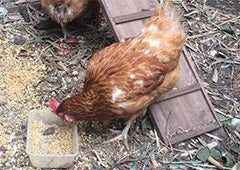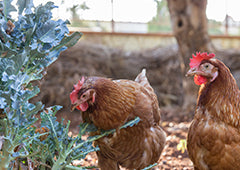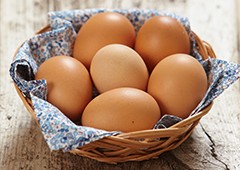Your girls, being the wonderful and generous creatures they are, have once again provided you with a lovely bounty of eggs as per every morning. You have quite a growing collection- how long will they last? Can I freeze them? What about if they’re boiled?
And who could forget the ever controversial debate of whether to keep eggs in the fridge or not!
Below is a great go-to guide if you have ever pondered the shelf life of these nutritional powerhouses!
Despite the debate that almost divided a nation, it seems that Aussies do actually prefer to keep their eggs in the fridge- in climates where temperatures are known to fluctuate, this is probably the safest option. When storing eggs in the fridge, no matter what model or make the fridge is, they should not be kept in the door, but instead in the main area. This is to ensure they are kept at a consistent and cool temperature, and aren’t jostled about which can cause them to deteriorate quickly.
If possible, keep your eggs in an egg carton.The carton slows down moisture loss and so protects the eggs from absorbing other strong flavours or odours of other foods in your fridge- garlic eggs, not so great for that pavlova!
- Uncooked Eggs
When refrigerated to the standards noted above, uncooked eggs (in their shells) should last around 4-5 weeks without significant quality loss. It is important to note that this timeframe is from when the eggs were laid (another point why fresh is best!).
However, these times will greatly differ if you are wanting to refrigerate either an egg white or yolk on its own- both are best to be used within 2-4 days.
- Hard Boiled Eggs
If you are one of those people who are forever one step ahead, it is more than likely that you will have some pre-boiled eggs in your fridge- perfect for a snack attack! Unlike uncooked eggs, hard boiled eggs will only last in the fridge for up to a week. This is because, when the eggs are boiled they are stripped of a mineral coating, leaving it more susceptible to bacteria.
Eggs in the Freezer
If you have an abundance of eggs that just aren’t going to get used in time, they can be frozen for up to four months.To ensure they maintain their high quality,crack and gently beat the eggs until they are just blended, then carefully pour them into freezer safe containers and seal tightly. Be sure to date the eggs so you can keep track of their freshness! If you’re wanting to freeze the egg whites and yolks separately this can also be done- although the yolk does require a little special treatment. For whites, it is the same procedure for a whole egg, just make sure you are extra careful not to get yolk in the whites! Because of the gelation property of an egg yolk, over time it can cause it to thicken or gel when frozen, which can make them near impossible to use in a recipe. To slow down this process, beat in either one eighth of a teaspoon of salt, or one and a half teaspoons of sugar or corn syrup per four egg yolks- salt for main dishes, sugar for desserts. You should avoid freezing hard boiled eggs as it will often cause the white of the egg to become quite tough and watery- not great for consumption!
Eggs at Room Temperature
While there are many for and againsts for keeping eggs at room temperature, it really does come down to the climate you live in. For those of you living in far North Queensland and quite warm climates, it is best that eggs are kept in the fridge so they can maintain their quality, and are not at the risk of bacterial attack. Those that live in cooler climates may have more success with keeping their eggs outside of the fridge, with more moderate temperatures not making them so vulnerable to spoilage. If you do choose to keep your eggs outside of the fridge, or need your eggs at room temperature for baking purposes, make sure they are in a temperature controlled area and not placed in direct sunlight- this will ensure your fresh eggs stay fresh!
If you’re still having doubts about the freshness of your eggs, there are a few simple ways you can tell just how fresh those eggs really are.
- The Sink or Float Test
Place your egg in a bowl or glass of water- fresh eggs DO NOT float! One of your very own farm fresh eggs will sink to the bottom and lay on the side. Older eggs will sink to the bottom, but may stand up a bit. As long as the egg stays on the bottom, it is fine to eat or cook with.
- The Shake the Egg Test
Hold the egg up to your ear, gently shake the egg, listening for a sloshing sound. Fresh eggs DO NOT slosh! So if there is silence- you’re safe.
- The Crack Open Test
Simply crack an egg open on a flat plate. If an egg is fresh, the egg yolk will be a nice spherical shape, while the egg white will be bright white in colour and nicely amassed around it. In a slightly older egg, but still fresh, the egg white will look transparent- the older the egg, the more the white will run upon cracking.
One of the biggest benefits of keeping chickens is having a great supply of fresh eggs. Nothing beats having home-laid eggs in the house for delicious meals and baking treats. However, in order to get a frequent, fresh supply of eggs, keepers need to look after the chickens that lay them. There can be multiple issues that are stopping your ladies from laying which is stressful for them and for you!
Don’t worry though – the eggsperts at Chickenpedia have cracked it! They have created the Eggs in Your Basket course to help you, help your ladies lay successfully. Discover crucial information to keep your chickens happy, healthy, and frequent layers. All your egg questions will be answered in this extensive course.
From double yolkers, to soft shells, no eggs, to odd eggs, Chickenpedia cover it all! Check out their great beginner-friendly courses today.
We love chickens, so we love eggs! If you want to know anything and everything about eggs, our online learning centre is the place to go- get egg-cited!


















